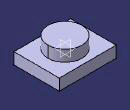
3D PLM PPR Hub Open Gateway |
File XPDM (PX1) |
Retrieving Information on a Document Without Loading itHow to retrieve its type, its last save path, and its last save version? |
| Use Case | ||
AbstractThis article shows how to retrieve some information on a file document without loading it:
|
This use case is intended to show you how to use the CATIxPDMItem interface to retrieve information on a file document. Mainly through samples, you will learn the meaning and the limits of three methods of this interface:
GetItemType, to retrieve
the real type of the document
(CATPart, CATProduct). GetLastSavePath,
to retrieve the last file path.GetLastSaveVersion,
to retrieve the CATIA version used for the
last save,[Top]
CAAxPDMCheckDocType is a use case of the CAAxPDMInterfaces.edu framework that illustrates CATxPDMInterfaces framework capabilities. Be careful, such as all use cases illustrating the CATxPDMInterfaces framework, the current one requires a PX1 licence.
[Top]
CAAxPDMCheckDocType begins by opening a session, then retrieves and displays the information about a given file, without loading it, and finally closes the session.
Here are given the outputs of the use case for different files located in the following directory:
| Windows | InstallRootDirectory\CAAxPDMInterfaces.edu\InputData\DocCheck |
| Unix | InstallRootDirectory/CAAxPDMInterfaces.edu/InputData/DocCheck |
where InstallRootDirectory is the directory where the CAA
CD-ROM is installed.
Before to detail the different cases, we specify where come from the outputs.
To reduce the output string, we have cut the middle of the complete file name (\...\) to keep only the most important string, the filename and its extension.
GetItemType
GetLastSavePathGetLastSaveVersion
...
Read all information on file : E:\...\
|
Part1 is really a Part document, so the returned type is "CATPart". You can see that the file has been moved (or copied) from its last Save operation, because the Save path is different from the input file path. The version is not displayed because the document has been created before the V5R10 level. (The version can be found only for document created after the V5R10). The last output, is the filename of the preview file.
 |
If you copy Part1.CATPart into Part1 (without extension), or into
Part1.txt, or into Part1.xxx ( xxx is what you want), the returned type of
GetItemType will be ever "CATPart".
...
Read all information on file : E:\...\
|
Part3 is really a Part document, so the returned type is "CATPart". You can see that the file has been moved (or copied) from its last Save operation, because the Save path is different from the input file path. Part3 has been saved for the last time with the V5R14SP2 level. The generated preview file is the following:
 |
...
Read all information on file : E:\...\
|
Despite the file extension of Part1 (.CATProduct), the file is not a Product document, but a Part document, so the returned type is "CATPart". The version is not displayed because the document has been created before the V5R10 level. The generated preview file is the same image as the Part1.CATPart.
...
Read all information on file : E:\...\
|
Root is really a Product document. You can see on the output path that it has been renamed (outside CATIA). There is no displayed version because the document has been created before the V5R10 level.
The generated preview file is the following:
 |
...
Read all information on file : E:\...\
|
CUBE is a model document. The type returned by GetItemType is
model. The file path and the version are not displayed because it is not a V5
document. There is no previous file.
...
Read all information on file : E:\...\
|
The MyTextDocChec file is
a txt file. The type returned by GetItemType is txt.
The file path and the version are not displayed because it is not a V5
document. There is no previous file.
Attention, if MyTextDocChec
was not a txt file, but an xls file for example, the returned type
will by nevertheless txt. The GetItemType method
returns the extension without check if the input file is not a V5 file (
CATPart, CATProduct, ....).
...
Read all information on file : E:\...\
|
The MyTextDocCheck file is
actually a txt file with a V5 extension. The GetItemType
method returns the "NotAV5File" string. The file path and the version are not
displayed because it is not a V5 document. There is no previous file.
... Read all information on file : E:\...\ |
The NoExistingDoc file does not exist.
It is not possible to create an item for it. The GetItemFromFile
method returns an error.
...
Read all information on file : E:\...\
|
The MyFileWithoutExtension file is a
file without extension, the GetItemFromFile does not return an
error, because the file exists on disk. But GetItemType
, GetLastSavePath and
GetLastSaveVersion fail.
[Top]
To launch CAAxPDMCheckDocType, you will need to set up the build time environment, then compile CAAxPDMCheckDocType along with its prerequisites, set up the run time environment, and then execute the use case [1]. To launch it, execute the following command:
mkrun -c "CAAxPDMCheckDocType FileName"
where Filename is the complete path of a file. You can
use those specified in the What Does CAAxPDMCheckDocType Do
section.
[Top]
The CAAxPDMCheckDocType use case is made of one single file, the CAAxPDMCheckDocTypeMain.cpp file, located in the CAAxPDMCheckDocType.m module of the CAAxPDMInterfaces.edu framework:
| Windows | InstallRootDirectory\CAAxPDMInterfaces.edu\CAAxPDMCheckDocType.m\ |
| Unix | InstallRootDirectory/CAAxPDMInterfaces.edu/CAAxPDMCheckDocType.m/ |
where InstallRootDirectory is the directory where the CAA
CD-ROM is installed.
[Top]
There are six logical steps in CAAxPDMCheckDocType:
[Top]
... HRESULT rc = S_OK; char * pSessionName = "CAA_Sample_Session"; CATSession *pSession = NULL; rc = ::Create_Session(pSessionName,pSession); CATUnicodeString filename = argv[1] ; ... |
CAAxPDMCheckDocType begins by creating a session and retrieving from the
command line the file path to analyze. filename must be a
complete path, in other words an absolute path.
[Top]
... CATIxPDMItem_var pIxPDMItem; rc = CATxPDMFileServices::GetItemFromFile(filename,pIxPDMItem); ... |
GetItemFromFile is a static method of the
CATxPDMFileServices class. It creates, or retrieves in session, an "item"
from a given file without uselessly loading it. This item is represented by
the CATIxPDMItem interface.
pIxPDMItem is a smart pointer on the item representing
filename, the input file name.
Finally, such as all methods of the CATxPDMFileServices class, the
GetItemFromFile method returns a CATError class instance
in case of failure. You retrieve this error thanks to
CATGetLastError, a
global function [2]. You have an illustration, with
the
NoExistingDoc case in the What Does
CAAxPDMCheckDocType Do section.
...
if (FAILED(rc))
{
CATError * pError = CATError::CATGetLastError(rc);
if ( NULL != pError )
{
CATUnicodeString ErrorMessage = pError->GetNLSMessage() ;
...
|
[Top]
...
CATUnicodeString LocalDocType;
if (SUCCEEDED(pIxPDMItem->GetItemType(LocalDocType)))
{
if (LocalDocType=="NotAV5File")
{
....
}
...
|
Once you have an item of the input file, an item represented by
pIxPDMItem, you can retrieve the type of the input file.
LocalDocType, the file type, is the output argument of the
GetItemType method.
Its specifications are the following:
LocalDocType=CATProduct)-
It is really a Product documentLocalDocType=CATPart)-
It is really a Part documentLocalDocType=CATPart)-
It is actually a Part document.
the "NotAV5File" string is returnedLocalDocType=NotAV5File
LocalDocType=CATPart)-
It is really a Part documentLocalDocType=model)
LocalDocType=txt)LocalDocType=CATPart)-
It is really a Part documentGetItemType returns
E_FAIL[Top]
... CATUnicodeString SavePath; if (SUCCEEDED(pIxPDMItem->GetLastSavePath(SavePath))) ... |
The GetLastSavePath method
returns the complete file path used during the last Save operation. This
method is successful only for V5 document.
[Top]
... CATUnicodeString SaveVersion; if (SUCCEEDED(pIxPDMItem->GetLastSaveVersion(SaveVersion))) ... |
The none NLS string returned by the
GetLastSaveVersion method of the CATIxPDMItem interface
gives you the CATIA level when the document has been saved for the
last time. This string is the concatenation of the following four
sub-strings, and in this order:
| Sub-string Syntax | Meaning | Comments |
|---|---|---|
<Version>X</Version> |
The version number | |
<Release>X</Release> |
The release number | |
<ServicePack>X</ServicePack> |
The service pack number | if X is equal to zero it is a GA level |
<HotFix>X</HotFix> |
The hot fix number | if X is equal to zero it is not an Hot Fix |
These information can be retrieved only for document created from and after the V5R10, except for the Hot fix number which it is only available for document created from and after V5R14.
[Top]
... CATUnicodeString PathPreviewImage; CATUnicodeString FormatPreviewImage="jpg" ; if (SUCCEEDED(pIxPDMItem->GeneratePreview(FormatPreviewImage, PathPreviewImage))) ... |
The GeneratePreview method generates a file containing the
preview of the V5 document. The first argument is the format of the image (
jpg for example), and the second one is the file name. The nomenclature is
the following : the name of the file + Its V5 extension. See the different
samples in the What Does CAAxPDMCheckDocType Do section.
[Top]
The session is closed using the global function named Delete_Session.
... rc = ::Delete_Session(pSessionName); ... |
pSessionName is the name of the session declared and used
in the Prolog section.
[Top]
You have learned that without loading a file in session you can check that it is a real V5 file name, retrieve its last save path, retrieve the CATIA version when it has been saved last time, and generate its previous file.
[Top]
| [1] | Building and Launching a CAA V5 Use Case |
| [2] | Managing Errors Using HRESULT |
| [Top] | |
| Version: 1 [Jan 2005] | Document created |
| [Top] | |
Copyright © 2005, Dassault Systèmes. All rights reserved.